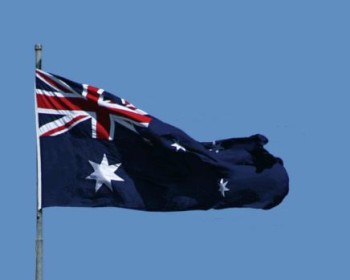
Flying Australian flag (Credit: Wikimedia)
The Tully Times broke press council standards with a one-sided article critical of broadband TV network in the Tully region, NBN, the Australian Press Council ruled. The Tully Times‘ Oct. 29 and Nov. 5 print articles didn’t include comment or response from NBN, even though one of the articles said NBN failed to respond to a request for comment.
But, the newspaper has shut down in the eight months between the article publication and the time the ruling was released on June 29. “The Tully Times has ceased publication, so it is only the Press Council that is able to ‘publish’ the adjudication, and disseminate it through our usual channels, in this instance,” the press council told iMediaEthics by e-mail.
The Tully Times‘ articles were the Oct. 29 front-page story “No Brains Network” and the Nov. 5 article “NBN and country newspapers.”
According to the Tully & District Chamber of Commerce, the Tully Times was a weekly newspaper “with two fulltime journalists.” The Times‘ website goes to a 404 page. Australian site ProPrint reported last month that the Tully Times shut down this summer because its owner and editor, John Hughes, died. iMediaEthics contacted the Times‘ website in an attempt to get comment regardless.
NBN declined to comment to iMediaEthics about the ruling.
NBN complained to the Australian Press Council, calling the articles misleading and unfair, pointing out that “they relied entirely on the opinion of one local businessman and cable technician, and contained no input from NBN Co,” according to the council’s ruling. Even though the Times never contacted NBN’s press department, NBN’s Corporate Affairs Manager e-mailed the Tully Times in between the two articles to respond to the claims but the Tully Times didn’t publish the response.
NBN also complained noting that the Nov. 5 article said “at the time of going to press, there had been no response … from the NBN,” but the Tully Times never contacted NBN.
The Tully Times told the press council it unsuccessfully tried contacting a “qualified technician” at NBN for the Oct. 29 article, arguing the Corporate Affairs Manager might not be able to answer its questions. Further, the Tully Times said it rejected NBN’s correction request because it “lacked attribution to any person within NBN Co whose role was to deal with issues of a technical nature,” according to the press council. Finally, the Tully Times claimed the article couldn’t have harmed because it didn’t criticize a specific person,” the council explained.
However, the council disagreed, ruling in favor of NBN on each of its complaints.
“Although the factual inaccuracies in the articles were not major ones, the lack of any alternate analysis being presented to readers rendered them misleading,” the council ruled. “The publication failed to take reasonable steps to ensure the articles were not misleading.”
The council specifically said it was “misleading and lacking in balance” for the Tully Times to say NBN wouldn’t respond to its request when it never contacted NBN. It was also wrong to not allow NBN’s Corporate Affairs Manager speak on behalf of NBN in response to the articles, the council ruled.
Read the full Australian Press Council ruling here.






Comments Terms and Conditions